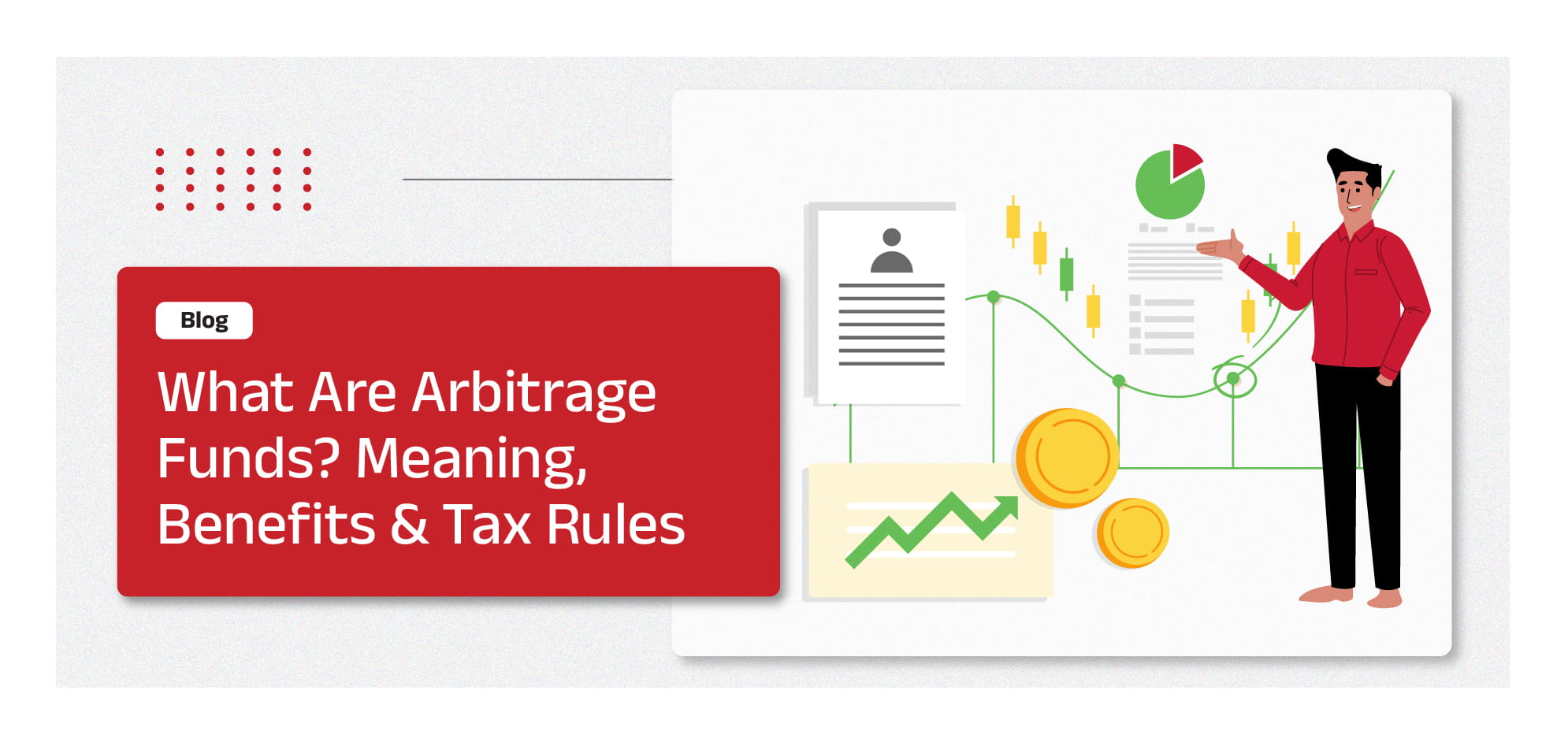-
Our Products
Our FundsFocus Funds
-
Self Care
Self-ServiceFind InformationWays To TransactPartner Solutions
-
Downloads
- Learnings
- About Us
-
More
-
Shareholders
-
Shareholders
-
-
SIP Calculators
- Back
-
Shareholders

IMPORTANT ALERT ! Beware of Fake AMC App, Online Impersonation & Scam WhatsApp Groups

What are Arbitrage Funds? Basics & Benefits

Sep 16, 2025
5 Min
0 Rating
Markets move unpredictably - up one day, down the next. But some funds don’t rely on direction at all. Arbitrage funds make money from price gaps between cash and futures markets. They’re treated as equity for tax purposes but act like low-risk investments, perfect for parking short-term cash.
This blog will cover:
The basics of arbitrage funds
How they work in different markets
When and why to use them
The ideal type of investor
If you’ve wanted the safety of debt with the tax benefits of equity, this guide will show you how arbitrage funds fit the bill.
What is an Arbitrage Fund?
Not all investors want to chase stock rallies. Some want peace of mind and tax efficiency. Arbitrage funds deliver both. They profit from temporary price differences between markets, earning steady returns even when markets move sideways.
Main features:
Taxed as equity, safer than typical equity funds
Ideal during volatile markets
Usually low-risk and short-term in nature
Depend on market opportunities, not direction
For people who prefer a safe place for idle money but still want equity-style tax treatment, arbitrage funds can be considered as one of the alternatives.
How Arbitrage Funds Work (Example of price mismatch)
Here’s a simple example that shows how arbitrage works and why it stays safe even if prices move up or down.
Let’s assume:
The stock price in the cash (spot) market is ₹1,200.
At the same time, its futures contract is trading at ₹1,230.
The fund buys the stock in the spot market and sells it in the futures market.
Now let’s look at different scenarios at expiry:
Price at F&O Expiry |
Buy at ₹1,200 (Spot) |
Sell at ₹1,230 (Futures) |
Net Profit (₹) |
₹1,250 |
+50 |
-20 |
+30 |
₹1,150 |
-50 |
+80 |
+30 |
₹1,200 |
0 |
+30 |
+30 |
No matter where the price moves, the gain stays the same - ₹30 per share. That’s the essence of arbitrage: risk-free profit from price differences, not from predicting market direction.
Benefits of Arbitrage Funds
Before choosing, it’s helpful to know what makes arbitrage funds stand out:
Low risk
One of the biggest advantages of arbitrage funds is their low risk. They don’t rely on whether the market goes up or down. Instead, they lock in profits by buying and selling at the same time in two markets. This shields them from price swings. For investors who prefer stability over speculation, arbitrage funds provide a safe, market-linked way to earn modest, predictable returns.

Tax efficiency
One big plus is how they’re taxed. Even though they behave like debt funds, the government counts them as equity. That means you may pay less tax compared to many short-term debt funds. Over time, this can help you keep more of your earnings.
Liquidity
Arbitrage funds are easy to get in and out of. You’re not locked in. If you need your money, you can withdraw without penalty, and it’s usually back in your bank within a couple of days. This makes them useful for both investors and businesses looking for flexible parking options.
Who should invest?
Arbitrage funds are not for everyone, but they suit certain types of investors well. Here’s who can consider them:
Best suited for:
Investors looking for low-risk, market-linked returns
People who want better tax treatment than most debt funds
Those parking money for 3–12 months
Conservative investors avoiding stock market swings
Businesses and HNIs needing a safe place for large funds
Risks & Limitations of Arbitrage Funds
While arbitrage funds are low-risk, they are not completely risk-free. Here are the main limitations to keep in mind:
1. Market Conditions Can Affect Returns
If markets are very calm, price gaps may be smaller.
Fewer opportunities can reduce overall profits.
2. Liquidity Risk
Some stocks may not be liquid enough to execute trades quickly.
This can delay profits or slightly affect returns.
3. Expense Ratio Impact
Fund management fees can eat into small arbitrage gains.
Always compare expense ratios before choosing a fund.
4. Not a High-Growth Option
Returns are modest
Best suited for safety and stability, not wealth multiplication.
5. Tax Rules May Change
Though currently taxed like equity funds, future changes can affect post-tax returns.
6. Opportunity Cost
Money in arbitrage funds may earn less than other aggressive investments in a bull market.
In short, they’re safe and steady but should be chosen with realistic expectations.
Conclusion
Arbitrage funds are all about making the most of small opportunities safely. They earn from market gaps, not trends, offering stability and tax efficiency. While they may not replace high-growth equity investments, they give you confidence that your money is working in the right way. Because sometimes slow and steady truly win the race!
Disclaimers:
The information herein is meant only for general reading purposes and the views being expressed only constitute opinions and therefore cannot be considered as guidelines, recommendations or as a professional guide for the readers. The document has been prepared on the basis of publicly available information, internally developed data and other sources believed to be reliable. Recipients of this information are advised to rely on their own analysis, interpretations & investigations. Readers are also advised to seek independent professional advice in order to arrive at an informed investment decision.
Investors are advised to consult their Tax Consultant or Financial Advisor to determine tax benefits applicable to them.
Mutual Fund investments are subject to market risks, read all scheme related documents carefully.
No. They are low-risk but not completely risk-free.
Taxed like equity funds: 15% short-term, 10% long-term above ₹1 lakh.
Arbitrage fund returns can be slightly higher, but both are safe for short-term parking.
3–12 months is generally ideal.
No. Returns are generally stable but not guaranteed.





 1800-270-7000
1800-270-7000



